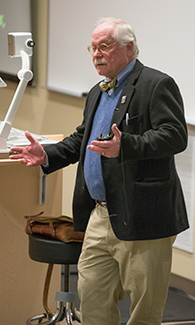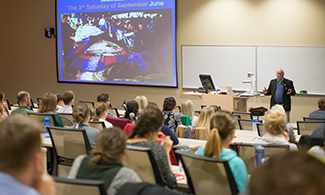Monday, February 8, 2016
Center for Research hosts founder of “Clinic for Special Children”
Mon, 08 Feb 2016Shelley Andrews :: LUCOM Marketing and PR
For close to 30 years, D. Holmes Morton, M.D., has focused his medical career around rural Lancaster County, Pa., home to a large Amish community. He and his wife co-founded the Clinic for Special Children there in 1989.
“I didn’t go to Lancaster County naively. I knew the problems they had were interesting, the needs were great and that these populations would teach us a lot about medical care at all levels,” said Dr. Morton.
 Dr. Morton walked student-doctors through the progression and advancement of the Clinic for Special Children in a special presentation at Liberty University College of Osteopathic Medicine (LUCOM) on Jan. 21. The lecture was part of the Biomedical Frontiers Seminar Series hosted by the LUCOM Center for Research.
Dr. Morton walked student-doctors through the progression and advancement of the Clinic for Special Children in a special presentation at Liberty University College of Osteopathic Medicine (LUCOM) on Jan. 21. The lecture was part of the Biomedical Frontiers Seminar Series hosted by the LUCOM Center for Research.
“If I look back at the history of this clinic and the history of my whole career, it comes down to starting with a patient who had an unusual problem and then studying that disease in depth,” said Dr. Morton.
In June 1988, Dr. Morton saw his first Amish patient as a postdoctoral fellow. The boy was four-years-old with glutaric aciduria type 1, an inherited disorder in which the body is unable to process certain proteins properly.
At the time, it was an unknown, obscure disorder. But Dr. Morton and others found more cases in the community and that experience led to the formation of the Clinic for Special Children the next year.
“The idea of having clinics embedded in a community where there is a high prevalence of genetic disorders was kind of unique. We took technology to a community where there was a not a lot of technology. We gained acceptance because we were able to convince them that by using this technology we could help improve the lives of their children and that together we could make a difference,” said Dr. Morton.
With attention and research, the perception and treatment of glutaric aciduria type 1 changed drastically.
“By 2000, when the American Academy of Human Genetics did a poll of pediatricians to find out which disorders should be screened for, it was at the top of the list. It was considered one of the most treatable and one of the more common disorders. All of those years it had been undiagnosed or under diagnosed,” said Dr. Morton.
Currently, three pediatricians work in the Clinic for Special Children and follow 2,500 hundred patients with 170 recessive disorders from the Lancaster County population. They provide accessible and affordable care to children of all ages while also advancing research and understanding of these disorders.
Dr. Morton believes the location of the clinic is one of its most important assets.
“The success of the clinic really depends on local medical care of the patient. That’s how we learn about these diseases and become invested in advancing the health of the individual patient,” said Dr. Morton.
Joseph Brewer, Ph.D., Associate Dean for Research, is impressed by the risk Dr. Morton took to make a difference in genetic medicine for the patients he chooses to serve.
 “He is a man who followed his heart to do something unique for a special group of people that in many ways, people were not doing or would ever do,” said Dr. Brewer. “And he said, ‘Let’s go there and reach out in a special way.’”
“He is a man who followed his heart to do something unique for a special group of people that in many ways, people were not doing or would ever do,” said Dr. Brewer. “And he said, ‘Let’s go there and reach out in a special way.’”
Dr. Brewer also hopes the presentation left an imprint on student-doctors about the importance of their hours and hours of studying and preparation for their careers.
“All of the basic biomedical science students take during their medical school education, the molecular and cellular details of how the body is built and functions, pay off by providing the foundation for diagnosing, understanding and treating human diseases,” said Brewer. “We can all learn so much from children challenged with various special needs.”